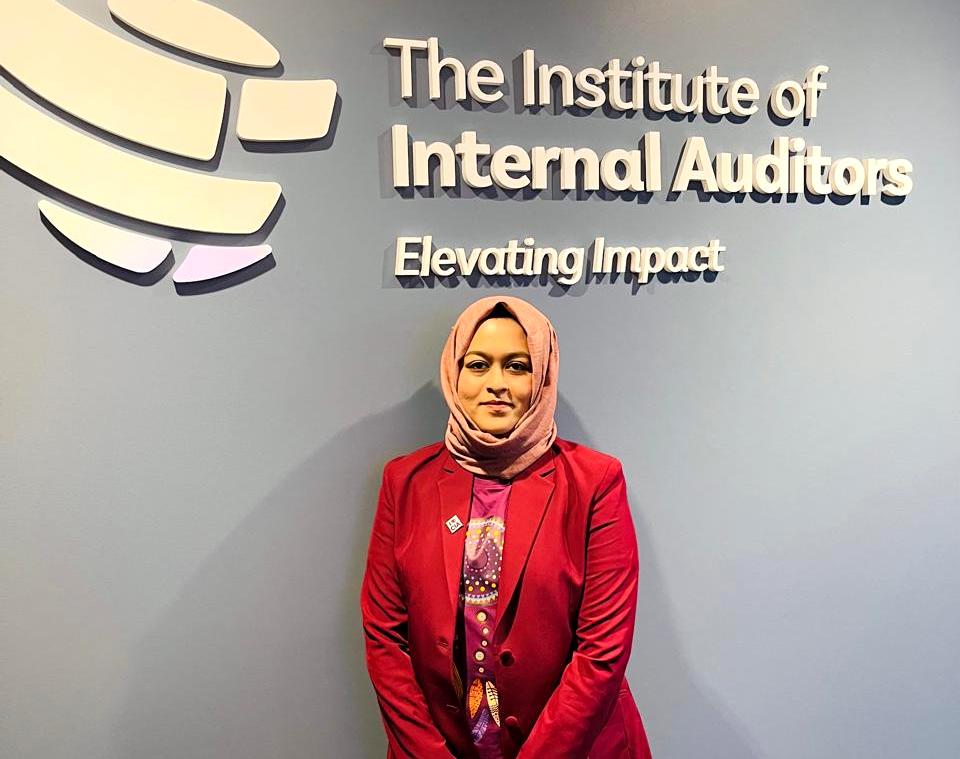Nausheen Ahmed
Joint Director – Head of Internal Audit and Compliance
BRAC University
Ms. Nausheen Ahmed is a distinguished finance professional with an MBA in Accounting and Information Systems from the University of Dhaka. With over 12 years of experience across various sectors, she currently serves as the Joint Director and Head of Internal Audit and Compliance at BRAC University. Ms. Ahmed is a Certified Internal Auditor (CIA), Certified Risk Management Assurance Expert (CRMA), and Certified Information System Auditor (CISA). She is recognized as one of the top 15 emerging leaders by the Institute of Internal Auditors USA, where she also serves on the Exam Development Committee. Additionally, she is the first female board member and Chair of the Training and Professional Development Committee in the IIA Bangladesh chapter. Ms. Ahmed is passionate about innovative learning methods and has developed mobile applications for knowledge sharing and instant assessment.
The InCAP: Ms. Nausheen Ahmed, please share your professional and academic peregrination for our readers!
Ms. Nausheen Ahmed: After my graduation in Finance from University of Dhaka, I was very eager to start career as a Finance Professional, back in 2012. Working as an Internal Auditor was not even in my conscious thought! I knew a little about Internal Audit and I didn’t even have any course on it during my undergrad level. One fine morning I saw a job circular on Internal Audit in a well reputed local conglomerate of Bangladesh and I applied for it just an out of curiosity. During the interview, I was explained about the prospect and dynamism of internal audit profession by the Head of the department and most importantly about CIA (Certified Internal Auditor) certification. Afterwards, I googled a lot about IA profession and came to know about several prestigious certification on it. I decided to join there and started my professional career journey as Executive of Risk Management and Internal Audit at ACI Limited. Although I became very passionate about internal audit profession and was planning to prepare for CIA, I had to leave that job due to some personal issues. Then I switched to other industries, like I worked as a Research Associate in Credit Rating Agency of Bangladesh and later on as a Business Intelligence Analyst at Dnet (A social enterprise). But deep inside somewhere I had a special corner for internal audit. That’s why, after having a much of career shifting, I came back again to Internal Audit, back in 2018, again with ACI Limited. I am grateful to my then boss for giving me the opportunity again. Afterwards, I worked as Deputy Manager of Internal Control and Audit at Marico Bangladesh Limited, then Assistant Director of Internal Audit at ASA International Microfinance. Now I am heading the Internal Control and Compliance Department of BRAC University since January 2024. I have completed my MBA in Accounting and Information System from University of Dhaka back in 2016. I have also some professional certification like I am a Certified Internal Auditor (CIA) and Certification in Risk Management Assurance (CRMA) which are issued by the Institute of Internal Auditors (USA). I have IT audit related certification like Certified Information Systems Auditor (CISA) issued by ISACA, USA. I am also Exam Development Committee member of the Institute of Internal Auditors (IIA) headquartered in USA where I am the only member from the South Asia. The IIA global has local chapter in Bangladesh where I am the first ever female board member and Chair of Training and Professional Development Committee.
What inspired you to pursue a career in internal auditing, and how has your journey been so far?
As I have already said above I had no plan at all to start career as an Internal Auditor. Even my parents did not like it when I joined as an internal auditor in my first company. At first I used to think like Internal Audit would be a boring job, but as the days passed by, I found it very much exciting beyond my expectation. I did not find any other function as dynamic as Internal Audit, because the charming part of working here is I can have the blend of finance, marketing, supply chain, business Intelligence and what not! Even when I work in consultative roles as a trusted advisor, it adds much gravity towards the profession. After having the international certification on internal audit, my professional value has been enhanced very much. Each time I switched a job, I got a higher position into the ladder. Also, I have made myself involved with different voluntary role of The Institute of Internal Auditors Bangladesh (IIA Bangladesh) which could pave my path to work with the IIA global headquartered in USA. And it happened as I got opportunity to become a member of the Exam Development Committee, the only member from South Asia. Every year, they are inviting me to attend special meetings at different parts of the world. This year I have also visited the IIA Global headquarter in Folrida, USA where I represented Bangladesh. Even I mentored and still mentoring many international internal audit professionals about how to progress career in internal audit. Once I got emerging leader awards from IIA Global which is a big leaf into my professional journey. Thus I can tell my journey with internal audit is so much enriching and fulfilling.

Can you please share an example of a challenging audit you led and the impact it had on the organization?
Actually, I can’t give any specific example as it would be a confidential issue. But in a broad spectrum, I can tell that I had a huge contribution towards developing the internal control testing template by working with the first line and second line management, streamlining audit reporting process, enhancing audit protocol efficiency, developing comprehensive risk-based audit planning, Facilitating proactive compliance through control self-assessment, reshaping the risk management framework etc.
Ms. Nausheen, How do you approach integrating risk management and internal controls in diverse organizational environments?
Integrating risk management and internal control in diverse organizational environments is crucial for ensuring effective governance, compliance, and operational efficiency. Here are some key strategies to integrate risk management and internal control in diverse organizational environments:
- Establish a Risk Management Framework: Develop a comprehensive risk management framework that aligns with the organization’s objectives, culture, and risk appetite. Then identify and assess risks across various organizational functions, processes, and activities. Afterwards, prioritize risks based on their impact and likelihood of occurrence to focus resources on critical areas.
- Define Internal Control Objectives: Clearly define internal control objectives that support the organization’s overall strategic goals and risk management framework. Also, implement control activities to mitigate identified risks and ensure compliance with policies, regulations, and best practices.
- Integrate Risk Management and Internal Control Processes: First of all, align risk assessment findings with internal control activities to address identified risks effectively. Then, it needs to be ensured that internal controls are designed to mitigate key risks and provide reasonable assurance regarding the achievement of organizational objectives. Then monitor and review control effectiveness regularly to adapt to changing risk profiles and organizational dynamics.
- Promote Communication and Collaboration: Organizations should foster open communication and collaboration between risk management, internal audit, compliance, and other relevant functions within the organization. Senior management should encourage cross-functional teams to share information, insights, and best practices for a holistic approach to risk management and internal control.
- Leverage Technology and Data Analytics: Utilize technology solutions, such as risk management software and internal control tools, to streamline processes, automate controls, and enhance data analysis capabilities. Implement data analytics techniques to identify trends, anomalies, and potential risks in real-time, enabling proactive risk mitigation and control enhancements.
- Provide Ongoing Training and Awareness: Offer training programs and awareness sessions to employees at all levels to enhance their understanding of risk management principles, internal control requirements, and their roles in the process. Empower employees to report risks, control deficiencies, and compliance issues promptly to facilitate timely mitigation actions.
By integrating risk management and internal control in diverse organizational environments through these strategies, organizations can strengthen their resilience, enhance decision-making processes, and achieve sustainable performance while effectively managing risks.

As one of the top 15 emerging leaders recognized by the IIA, what key leadership qualities do you believe are essential for success in internal auditing?
Several key leadership qualities are essential for success in internal auditing. Here are some of the key qualities that internal audit leaders should possess:
1. Integrity: Integrity is fundamental for internal auditors as they are responsible for ensuring the organization’s compliance with policies, regulations, and ethical standards. Internal audit leaders must demonstrate honesty, trustworthiness, and ethical behavior in all aspects of their work.
2. Analytical Skills: Strong analytical skills are crucial for internal audit leaders to assess complex information, identify risks, and evaluate controls effectively. The ability to analyze data, recognize patterns, and draw meaningful insights is essential for making informed decisions.
3. Critical Thinking: Internal audit leaders should have strong critical thinking skills to evaluate situations objectively, identify root causes of issues, and develop practical solutions. They need to be able to think strategically and consider multiple perspectives when assessing risks and control effectiveness.
4. Communication Skills: Effective communication skills are essential for internal audit leaders to convey audit findings, recommendations, and risk assessments clearly and persuasively to stakeholders at all levels of the organization. Being able to communicate complex information in a simple and understandable manner is key.
5. Leadership and Influencing Skills: Internal audit leaders should demonstrate strong leadership skills to inspire and motivate their teams, drive change, and foster a culture of continuous improvement. They should also possess influencing skills to engage stakeholders, build relationships, and navigate challenging situations effectively.
6. Technical Proficiency: Internal audit leaders should have a strong understanding of auditing principles, practices, and standards to lead audit engagements effectively. Keeping abreast of emerging trends in auditing, technology, and regulatory requirements is essential to ensure audit quality and relevance.
7. Adaptability and Resilience: Internal audit leaders should be adaptable to changing circumstances, resilient in the face of challenges, and able to navigate ambiguity and uncertainty effectively. Flexibility and the ability to adjust strategies and approaches as needed are critical for success in dynamic environments.
8. Collaboration and Teamwork: Internal audit leaders should promote a collaborative and inclusive work environment, where team members are empowered to contribute their expertise and insights. Building strong relationships with stakeholders and fostering teamwork can enhance audit effectiveness and impact.
By embodying these key leadership qualities, internal audit leaders can drive value, promote accountability, and contribute to the organization’s success by providing independent and objective assurance on governance, risk management, and control processes.
What advice would you give to aspiring internal auditors, especially women, looking to make their mark in this field?
For aspiring internal auditors, especially women, looking to make their mark in the field of internal auditing, here is some advice to help you succeed and advance in your career:
1. Invest in Education and Professional Development:
– Obtain relevant certifications such as Certified Internal Auditor (CIA) or Certified Information Systems Auditor (CISA) to enhance your knowledge and credibility in the field.
– Pursue advanced degrees or specialized training in areas such as risk management, data analytics, or information security to broaden your skill set.
2. Build a Strong Foundation:
– Gain experience in different areas of auditing, such as financial, operational, and compliance auditing, to develop a well-rounded skill set.
– Seek opportunities to work on cross-functional projects and collaborate with other departments to understand the business from various perspectives.
3. Develop Strong Technical Skills:
– Enhance your technical skills in areas such as data analysis, information technology, and audit software tools to stay current with industry trends and best practices.
– Stay updated on regulatory requirements, audit standards, and emerging technologies that impact the internal audit profession.
4. Seek Mentorship and Networking Opportunities:
– Connect with experienced internal audit professionals, mentors, and peers to seek guidance, advice, and support in your career journey.
– Participate in internal audit associations, networking events, and conferences to expand your professional network and learn from industry experts.
I found women (not all) are mostly reluctant in networking.
5. Demonstrate Leadership and Initiative:
– Take on challenging assignments, lead projects, and showcase your leadership skills to demonstrate your potential for growth and advancement.
– Be proactive in seeking opportunities for professional growth, skill development, and career advancement within your organization.
6. Promote Diversity and Inclusion:
– Advocate for diversity and inclusion in the workplace and support initiatives that promote gender equality and empower women in the field of internal auditing.
– Be a role model for other aspiring female auditors and contribute to creating a more inclusive and supportive work environment.
7. Stay Resilient and Persistent:
– Internal auditing can be a demanding and challenging field, so it’s essential to stay resilient, persevere through obstacles, and maintain a positive attitude in the face of adversity.
– Embrace continuous learning, feedback, and growth opportunities to enhance your skills and capabilities as you progress in your career.
By following these pieces of advice and staying committed to your professional development and growth, aspiring internal auditors, especially women, can position themselves for success and make a significant impact in the field of internal auditing. There will always be some hurdles, but that should not limit you.
Ms. Nausheen Ahmed, please say something to the readers!
I always love to motivate our young minds or professionals who have just stepped into their professional journey or about to start career in different field:
- Believe in Yourself: Trust in your abilities, skills, and potential. You have what it takes to achieve your dreams and make a positive impact.
- Embrace Challenges: Challenges are opportunities for growth and learning. Embrace them, face them head-on, and use them to become stronger and more resilient.
- Stay Curious and Keep Learning: Never stop learning and exploring new ideas. Curiosity fuels creativity and innovation, helping you adapt to changing environments and excel in your career.
- Set Goals and Take Action: Define your goals, create a plan, and take consistent action towards achieving them. Every small step you take brings you closer to your aspirations.
- Seek Mentors and Role Models: Surround yourself with mentors, role models, and supportive individuals who can guide and inspire you on your journey. Learn from their experiences and insights.
- Celebrate Your Wins: Acknowledge your accomplishments, no matter how small they may seem. Celebrate your successes and use them as motivation to keep moving forward.
- Stay Positive and Resilient: Maintain a positive mindset, even in the face of setbacks or challenges. Your resilience and determination will help you overcome obstacles and achieve your goal.
- Take Care of Yourself: Remember to prioritize your well-being, both physically and mentally. Self-care is essential for maintaining balance and sustaining your energy and focus.
- Be Authentic and Stay True to Yourself: Stay true to your values, beliefs, and passions. Your authenticity is your strength and will guide you towards a fulfilling and purposeful career.
Remember, your journey as a young professional is unique, and it’s okay to face challenges and uncertainties along the way. Stay committed to your growth, stay positive, and believe in your potential to create a meaningful and successful career. You have the power to shape your future and make a difference in the world. Keep moving forward with confidence and determination and never forget to thank your Almighty for everything.

Quick Chat With Nausheen Ahmed
The most outstanding achievement of your life as of now:
Being awarded as one of the top 15 emerging leaders of the world in internal audit profession by the Institute of Internal Auditors.
The greatest philosopher in your view:
Well, I possess a little knowledge about the world’s greatest philosophers, but for me the greatest philosophers are the thought leaders of internal audit because their work and ideas have had a profound impact on the practice of internal audit. So, the most influential philosopher to me in terms of my professional area is Richard F. Chambers who is the former President and CEO of the Institute of Internal Auditors and has been a vocal advocate for the importance of internal audit in ensuring good governance and organizational success.
Your Icon:
Prophet Muhammad Sallallahu Aleihi Wa Sallam who is the greatest example of piety, compassion, wisdom and leadership.
How do you define patriotism?
Patriotism is the unwavering commitment to contribute positively to one’s nation—through integrity, innovation, and the pursuit of collective growth—while upholding values that inspire others to do the same.
Name the most influential books you have read:
The most influential book to me as a Muslim is Al Quran as it serves as a guide for Muslims in matters of faith, ethics and daily life. Apart from it, the power of Positive Thinking by Norman Vincent Peale and How to talk to anyone by Leile Lowndes are the most influential books for me.
Best piece of advice you’ve received:
One of my career coaches once said that there is nothing to be ashamed of failing because failing proves that you are at least trying and you have learned. That’s the best career advice I ever received which always motivate me to keep trying rather than focusing on the results because I am learning continuously whether I pass or fail.
You in only three words:
Passionate, Thoughtful and Curious.

Skill Set
- Hard Skills: Audit Program Development, Risk Assessment and Audit Plan Development, Policy Development and Implementation, Detailed Audit Reporting, Financial Analysis and Control, Operational Efficiency Improvement, Process Redesign and Optimization, Data Analysis and Interpretation, Project Management.
- Soft Skills: Leadership, Communication, Time Management, Decision Making, Stakeholder Management, Change Management, Continuous Learning, Problem Solving, Strategic Thinking, Collaboration.
Prayer For The Human Civilization:
May humanity find unity in diversity, compassion in times of struggle, and wisdom in times of decision. May we strive for peace, justice, and equality for all people regardless of their backgrounds. May we care for our planet and all its inhabitants, working together to create a sustainable and harmonious world. May love and understanding guide our actions, and may we always seek to build a better future for generations to come.
The InCAP: Thank you, Ms. Nausheen Ahmed! It’s a glittering conversation with you!
Ms. Nausheen Ahmed: My pleasure! Wish you all the best! Thank you.
To read more about Professional’s stories, Please Click Here!









